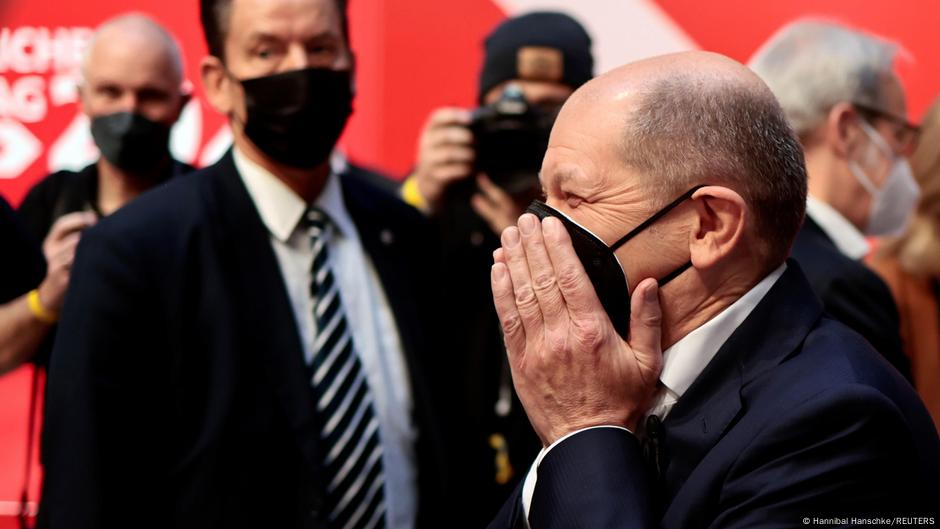Germany's SPD: Coalition Agreement Campaign Before Crucial Party Vote

Table of Contents
Key Arguments in the SPD's Coalition Agreement Campaign
The SPD is focusing its campaign on several key pillars of the coalition agreement, aiming to demonstrate its benefits to the party's diverse membership. These arguments center around specific policy promises designed to resonate with the party's base.
-
Ambitious Climate Change Initiatives: The agreement includes substantial investments in renewable energy, a commitment to phasing out coal, and significant targets for emissions reduction. The SPD is emphasizing this as a key element of its commitment to environmental sustainability and a crucial step towards a greener future for Germany. This aligns with the party's long-standing commitment to environmental protection and appeals to younger, environmentally conscious voters. The plan includes detailed proposals for investing in green technologies and creating green jobs, showcasing a concrete path towards achieving climate goals.
-
Targeted Economic Reforms: The SPD is highlighting its commitment to a socially just economic recovery, focusing on investments in infrastructure, education, and digitalization. The coalition agreement includes measures designed to strengthen the social safety net and ensure a fair distribution of wealth, addressing concerns about economic inequality. This includes specific proposals for tax reforms, aimed at supporting middle- and low-income families, and investments in workforce training programs to prepare for the challenges of the digital economy. Such proposals are central to the SPD's historical platform of social justice.
-
Modernization of Social Welfare Programs: The SPD is promoting improvements to social welfare programs, ensuring affordable healthcare, affordable housing, and strong social security. The party is emphasizing the agreement's commitment to strengthening social cohesion and supporting vulnerable populations. Specific proposals include increased funding for social services, improvements to long-term care, and reforms to ensure greater affordability of housing, appealing directly to the party's core base. This commitment represents a core tenet of the SPD's political identity and demonstrates its dedication to its traditional voter base.
The SPD is framing these policy points within a larger narrative of a long-term vision for Germany, one that emphasizes social justice, environmental responsibility, and sustainable economic growth. This broader vision aims to unify the party behind the coalition agreement, showcasing the agreement's comprehensive nature and its potential for positive long-term impact. The careful negotiation and resulting political compromise are being presented as a strength, showcasing the party’s ability to work collaboratively within a coalition government.
Challenges Facing the SPD in Securing Party Support
Despite the efforts to highlight the positives, the SPD faces considerable internal challenges in securing a majority vote for the coalition agreement. Significant internal divisions exist, with various factions expressing concerns about compromises on key policy positions.
-
Resistance from the Left Wing: Elements within the party’s left wing harbor reservations about what they perceive as insufficiently ambitious climate action and compromises on social welfare programs. These dissenting voices fear that the coalition agreement dilutes the SPD's core values. The fear is that concessions made to coalition partners might undermine the party's traditional commitment to social justice.
-
Concerns about Economic Policy: Certain factions express anxieties about the economic implications of the proposed reforms, fearing potential negative consequences for specific sectors or industries. This highlights the ongoing internal debate within the SPD regarding economic policy and the balance between economic growth and social equity.
-
Potential for a Rebellion: The level of internal dissent raises the possibility of a significant rebellion within the party, which could jeopardize the agreement's passage. This highlights the significant political risks involved and the potential ramifications for the future of the coalition negotiations. A failure to secure a majority vote could have serious consequences, potentially leading to the collapse of coalition talks and a prolonged period of political instability.
The potential consequences of a failed vote are severe, potentially impacting coalition talks and the stability of the German government. The failure to secure a majority would trigger a political crisis, potentially requiring renegotiation of the coalition agreement or even new elections. This underscores the high stakes of the upcoming vote and the significant challenge faced by the SPD leadership.
The SPD's Campaign Strategy and Tactics
The SPD is employing a multi-pronged campaign strategy to secure support for the coalition agreement.
-
Internal Communication: The party is utilizing its internal communication channels – party meetings, newsletters, and dedicated platforms – to directly engage members and address their concerns. This ensures a direct line of communication and allows for targeted messaging tailored to specific groups within the party.
-
Prominent Party Figures: Leading SPD figures are actively campaigning, traveling across the country to address members and promote the agreement. Their experience and political standing are leveraged to sway undecided members and foster a sense of unity. Public appearances, speeches and interviews are utilized to showcase their commitment and address concerns.
-
Public Relations: The SPD is actively engaging in public relations efforts to shape public opinion and build support for the agreement, creating a positive narrative surrounding the proposed policies. This campaign aims to both ensure support from its existing base while also demonstrating the benefit of the proposed policies to the wider electorate.
The Role of Social Media in the SPD's Campaign
Social media plays a crucial role in the SPD's campaign. The party is actively using various platforms to reach party members and the broader public, engaging in online discussions, addressing concerns, and disseminating information about the coalition agreement.
-
Targeted Messaging: Specific social media campaigns are deployed to reach different demographics within the party, addressing their specific concerns and anxieties.
-
Online Engagement: Interactive sessions and Q&A forums are used to directly engage with party members and respond to their questions, creating a transparent and participatory process.
-
Monitoring Public Sentiment: The party monitors online discussions and public sentiment to adapt its messaging and address concerns effectively. This allows the party to adjust its strategy in real-time and respond effectively to evolving concerns.
The SPD's use of social media demonstrates its awareness of the changing media landscape and its commitment to harnessing digital tools to reach a wider audience and improve its communication strategy.
Conclusion
The upcoming vote within Germany's SPD on the proposed coalition agreement represents a crucial juncture in German politics. The party's campaign strategy, skillfully navigating both internal divisions and external pressures, will significantly influence the outcome. The success or failure of securing party support will have profound implications for the formation of a stable government and the implementation of key policy initiatives. Understanding the complexities of this internal struggle within Germany's SPD offers essential insight into the future trajectory of German policy. Stay informed about the unfolding events surrounding Germany's SPD and the crucial vote on the coalition agreement. The future direction of Germany hinges on the outcome of this pivotal vote for Germany's SPD.

Featured Posts
-
 6 2 Rout Johnstons Blazing Fast Goal Fuels Stars Playoff Win
May 01, 2025
6 2 Rout Johnstons Blazing Fast Goal Fuels Stars Playoff Win
May 01, 2025 -
 Simple Shrimp Ramen Stir Fry For Weeknight Dinners
May 01, 2025
Simple Shrimp Ramen Stir Fry For Weeknight Dinners
May 01, 2025 -
 Kampen Start Kort Geding Tegen Enexis Voor Stroomaansluiting
May 01, 2025
Kampen Start Kort Geding Tegen Enexis Voor Stroomaansluiting
May 01, 2025 -
 Consumer Boycott And Traffic Drop After Targets Dei Policy Change
May 01, 2025
Consumer Boycott And Traffic Drop After Targets Dei Policy Change
May 01, 2025 -
 Maikel Garcia And Bobby Witt Jr Lead Royals To Victory Against Guardians
May 01, 2025
Maikel Garcia And Bobby Witt Jr Lead Royals To Victory Against Guardians
May 01, 2025
